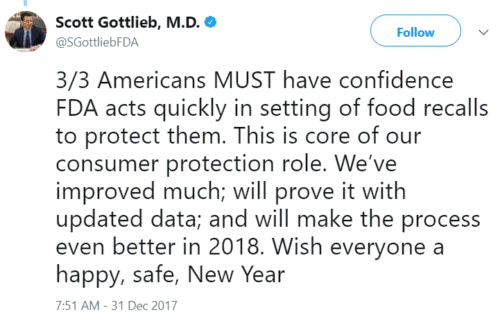When are added sugars not? The answer in FDA-speak.
Nutrition labels may seem self-evident but it takes volumes of Federal Register notices to explain how every word works. When it comes to food labels, the devil is in those details.
Take “Added Sugars,” coming soon to a food label near you.
How does the term apply to honey and maple syrup or, for that matter, sugar itself. These are sugars ready to add.
Pure honey and maple syrup producers are worried that when you see grams of Added Sugars on their labels, you will think that these natural products have been adulterated with—gasp—High Fructose Corn Syrup.
The producers of sugar-sweetened cranberry products are also concerned. They worry that the added sugars will discourage you from buying cranberries.
Here is how the FDA suggests dealing with these “problems,” in quotes because they are problems for producers, not you and me—we know what “added” means.
The purpose of this draft guidance is to advise food manufacturers of our intent to exercise enforcement discretion related to the use in the Nutrition Facts label of a symbol “†” immediately after the added sugars percent Daily Value information on single ingredient packages and/or containers of pure honey or pure maple syrup and on certain dried cranberry and cranberry juice products that are sweetened with added sugars and that contain total sugars at levels no greater than comparable products with endogenous (inherent) sugars, but no added sugars.
Got that?
Pure honey and maple syrup get a “†” indicating that they have no more sugar than any other comparable sugar.
Cranberries are more complicated:
With respect to the labeling of certain cranberry products, cranberries are a naturally tart fruit, and certain dried cranberries and cranberry juice products have added sugars added to them to bring the total sugars per serving up to levels comparable to the levels of non-cranberry competitor products that contain equivalent amounts of total sugars, but whose labels list zero “added sugars” because their fruit products are inherently sweet.
Did you get that?
If I read this FDA-speak correctly, the FDA is making an exception for cranberries. It agrees that the Added Sugars in cranberries also deserve a “†”.
Why is FDA allowing this? The Draft Guidance explains:
We received comments from the cranberry industry to the final rule and subsequent correspondence that the added sugars declaration would be detrimental to the cranberry industry by implying that cranberry products are less nutritious than competitive products that have similar amounts of total sugars and nutrients.
These comments were similar to those we received which noted that grape juice contains 36 grams of total sugar with no added sugars while cranberry cocktail, with sugars added for palatability because cranberries are naturally tart, generally contains 28 grams of total sugars including 25 grams of added sugars and has 30 fewer calories per serving than 100% grape juice.
Likewise, comments explained that sweetened dried cranberries contain 29 grams of total sugars including 25 grams of added sugars per serving while raisins contain 29 grams of total sugars with no added sugars per serving. Both sweetened dried cranberries and raisins have the same number of calories per serving and a similar nutrient profile.
In translation, you are not supposed to be concerned about the Added Sugars in cranberries.
But couldn’t you could buy real cranberries and add a whole lot less sugar than that?
Chalk this as a win for cranberry lobbyists.
The documents
- Download the Draft Guidance
- Federal Register Notice
- Constituent Update
- Changes to the Nutrition Facts Label
- Additional Labeling Guidance


